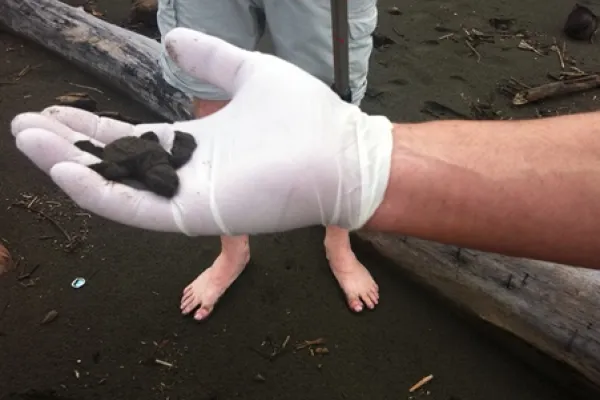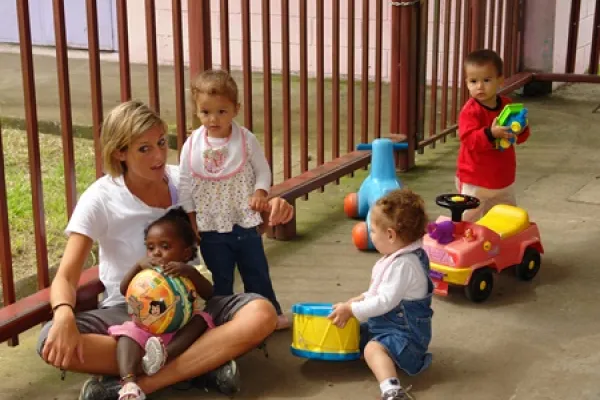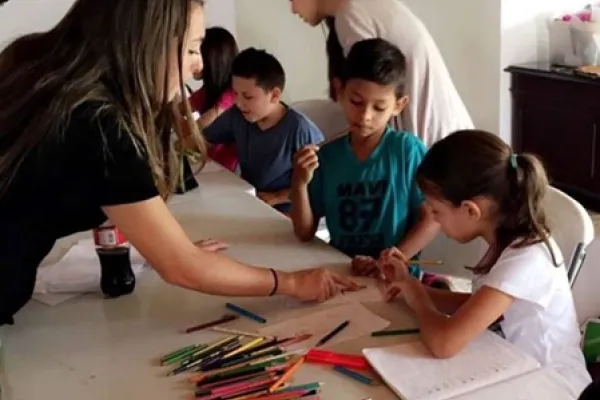Overview
Volunteers in this project participate in a community-driven conservation project that aims to conserve sea turtle nesting beach habitat on the Osa Peninsula in Costa Rica. They protect 8 km of beach where they register over 7000 nests per season from the Olive Ridley and Pacific green species.The Osa Peninsula is on the far south Pacific tip of Costa Rica, in one of the most bio diverse areas on the planet. It is home to Corcovado National Park, that encompasses a wide variety of distinct ecosystems including old growth primary rainforest, palm forests, mangrove swamps, and coastal and marine habitats. With this variety of ecosystems comes a large number of native, endemic and migratory species. The Osa Peninsula alone holds an estimated 2.5% of global biodiversity, with some 250,000 plant and animal species, over 300 of which are found nowhere else on the planet.
This project is actively working on 5 of the UN SDGs to help support the maintenance of a healthy planet.
Conservation and research on nesting sea turtle populations
Increase hatching success rates by protecting nests and in extreme cases, relocating nests to hatcheries.
Increasing the chances of hatchlings reaching mature adulthood.
Reduce predation and poaching rates on our beaches by carrying out regular patrols.
Helping turtles that have suffered injuries as a result of bycatch, pollution, and damages from boats, other animals, or natural causes.
Regular beach clean ups where we reuse garbage that is washed up on the beach and recycle the rest.
Collecting data and conducting research to influence policy makers and to fill in information gaps in scientific research studies.
Community involvement in conservation
Provide better jobs with a steady income to people in the community. Specifically gold miners and ex poachers.
Educate locals on the importance of conservation within their community, to promote safe practices of ecotourism, and be more aware of plastic consumption and littering.
Provide English lessons to improve the lives of locals and to help community members take on leading roles in our project for tours, education, and manage overseas volunteers.
Offer other services or tours, outside of turtle conservation, so that other community organizations may have a substantial income as well from ecotourism.
Education and activism
Promote environmentally responsible and sustainable economic opportunities
Leverage social media to promote environmental responsibility and awareness
Contributing to the advancement of local and national policy to further the Osa Peninsula's dedication to ecological sustainability
Developing and applying innovative methods for environmental research, conservation, and protection
A perfect program for, this program would give you an opportunity to gain first-hand work experience and contribute towards protecting the biodiversity of Costa Rica.
Volunteer Work Schedule
Volunteer Work Schedule
The weekly schedules must be flexible due to the nature of our environmental and community work and therefore if there are any changes to the schedule our staff will let you know as soon as possible. In terms of your work load, this will change depending on how many people are on camp, we may need you too help us out a little more than usual, but we will make sure you have time to rest. We will make sure that everyone has a minimum of one complete day off from required activities, however this will be designated by your camp leader and will fit around the weeks activities. If you would like to request a specific day off, please do so before the start of the week so it can be accounted for in the schedule.
Given below is a suggested plan, and might change according to circumstances :
Day 1, Sunday: Arrival in Puerto Jimenez
Arrival at Puerto Jimenez and transfer to a pre booked hostel accommodation in Puerto Jimenez. Arrival package for pickup and stay in San Jose is available at extra charges. There’s no pick up from the airport to the hostel included in Puerto Jimenez. Volunteers go on their own to the accommodation located in close proximity to the airport.
Day 2, Monday: Transfer to Volunteer Camp
Monday afternoon transfer to Camp Mariposa Azul. Meet and greet with the coordinator at the camp.
Days 3 to Day 8, Tuesday to Sunday: Working at the project site
Day 9, Monday : Return back to San Jose or continue program
Those participants who are doing the program for a week will be taken back to Puerto Jimenez this morning. Others will continue with the program further.
Things to Consider
Project Dates – The project is not available in May and June.
Pre Stay in San Jose – We can help you in arranging pickup and stay in San Jose before or after your program in Osa Peninsula.
Projects starts on Monday and ends on Mondays, volunteers need to be in Puerto Jimenez the night before (included in the project).
Minimum is one week, but more convenient to stay for longer
Poor Wi-Fi
Work can be physically demanding
Volunteer Role & Responsibilities
Volunteer Role & Responsibilities
Here’s a snapshot of the exciting activities you’l be involved in:
Turtle Patrols: Join daily patrols—spend 3-5 hours on Morning Patrols or 4-7 hours on Night Patrols.Protect new nests, record data on nesting females, tag flippers, excavate hatched nests, and assist with hatchling releases.
Daytime Activities: Participate in Beach Clean-ups to keep nesting sites pristine, sort and manage beach-collected plastics during Plastic Classification, teach English to locals through English Lessons, give Sea Turtle Conservation School Presentations, and help with Tree Planting and Maintenance to support local biodiversity.
Commitment and Enjoyment: Dive into project activities while also enjoying downtime to relax and explore the stunning Osa Peninsula.
Community Engagement: Connect with local communities to promote sustainable practices and environmental education, making a direct impact on sea turtle protection and conservation.
Project Requirement
Project Requirement
Volunteers must be 18 years or older at the time of joining the project. You need to have an open mind and a flexible attitude for working in a new and different environment. The volunteer should bring energy and enthusiasm to make a difference. Participants must be fit and healthy at the time of joining the program and should be prepared to work outdoors and get their hands dirty. Participants in the program should have a keen interest and love for environmental conservation work. Participants should have no criminal convictions and should provide a clean criminal background check report.Participants should be prepared for physically demanding work as you have to walk for several hours on the beach in all weathers looking for nesting adult turtles. Volunteers need to be responsible, flexible, patient and proactive.You should have enthusiasm to get involved and learn as well as the ability to work hard without constant supervision.This is a great opportunity to learn new skills, meet new people and make a real difference to the turtles and local community members.
Schedule a Google Meet with a Program Advisor
Interested in our programs? We're here to provide expert guidance
- Get Detailed Info
- 20 min One -on-One meeting
- Get expert advise
- Application Guidance
Photo Gallery









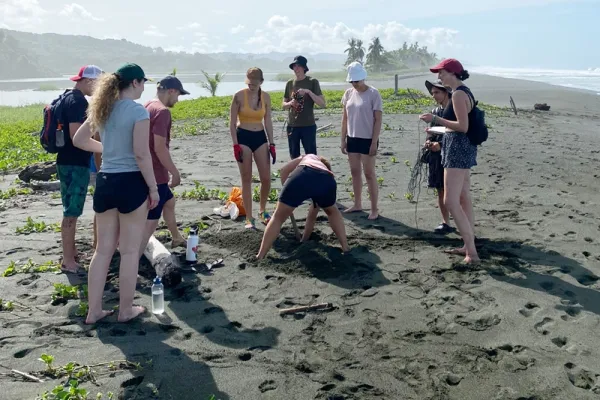
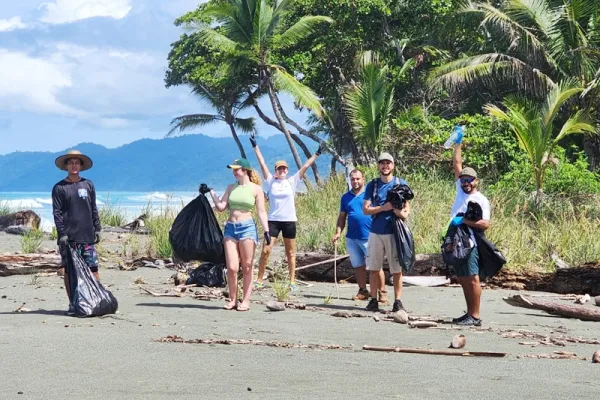
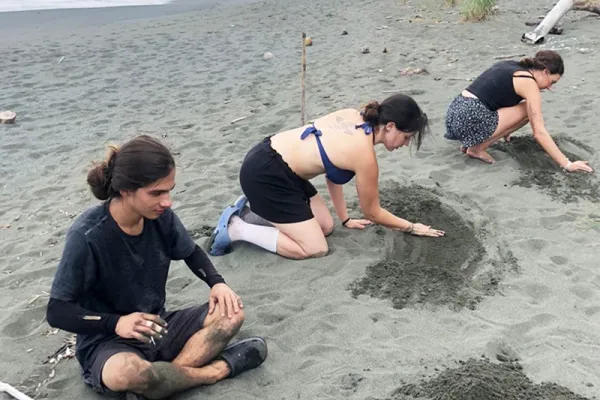
Living
Living
Airport Transfer
Participants need to arrive at Puerto Jimenez on a Sunday. You also have the option of booking airport pickup and pre stay in San Jose at extra charges.
There’s no pick up from the airport to the hostel included in Puerto Jimenez. Volunteers go on their own to the accommodation.
Accommodation
The rustic camp is made up of two mixed dormitory-style cabins with 8-10 volunteers per cabin, staff cabins, a communal kitchen, a chill-out area and a garden area with fruiting trees, a small greenhouse and a chicken coop. There is basic solar electricity and WiFi on the project, as well as western toilets and clean drinking water.
There are lots of areas to explore in search of wildlife!! We share our space with some awesome domestic animals. The camp is equipped with the following :-
- Clean drinking water
- Single beds
- Shared accommodation
- Shower and toilet block
- WiFi
- Basic solar power
- Handwashing laundry station
- Parking / camping area
- Communal area
- Fully equipped kitchen
An English speaking volunteer coordinator is living at the camp and will make each week a clear agenda with work and fun activities.
Orientation
All volunteers are given an orientation before starting the program by the project coordinator.Orientation is conducted by the local staff and covers topics such as Volunteer Roles and Responsibilities, Rules and Expectations, Safety and Introduction to your project and placement.
Meals
All meals are included at the camp and mostly vegetarian meals are provided.
During your Free Time
There are a lot of different activities around the Osa Península. Some of the activities are :-
- Corcovado National Park
- Surfing in Matapalo
- Horse-riding - Chocolate tour
- Whale and dolphin tour
- Waterfall hike
- Guided gold-mining tour
- Plus a lot of free activities: night walks, jungle walks, beach cleans, game and movie night, pizza nights, etc.
- Beach nearby the camp is NOT allowed for swimming however you can enjoy activities such as beach playing games, looking for animals or taking in the awesome views.
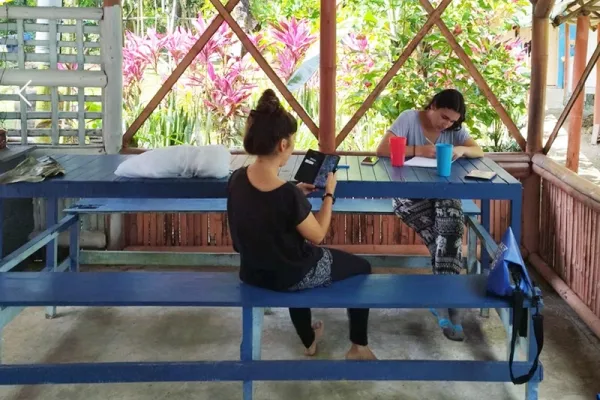

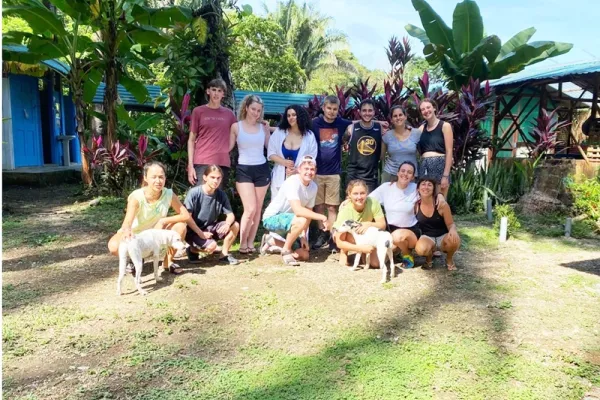
Dates
Dates
January
05
12
19
26
February
02
09
16
23
March
02
09
16
23
30
April
06
13
20
27
July
06
13
20
27
August
03
10
17
24
31
September
07
14
21
28
October
05
12
19
26
November
02
09
16
23
30
December
07
14
21
28
Available
Filling Fast
Booked Out
Costs
| Duration |
Program Fee
|
Choose your currency
|
|---|---|---|
| 1 Week | $650 | |
| 2 Weeks | $895 | |
| 3 Weeks | $1080 | |
| Extra Week | $300 |
Please Note: An application fee of is charged over and above the program fee as an application payment. A 5% international banking fee is charged for credit card payments of program fee in USD/AUD.
What are you Paying for?
- Pre departure information and support
- Pre departure handbook
- Pre-departure online (mindfulness) meeting
- Arrival on Sundays at Puerto Jimenez
- 1 overnight in Puerto Jimenez in a hostel
- Monday afternoon 1:30pm with colectivo/bus to Camp Accommodation
- Meet & greet with English volunteer coordinator at the camp
- Including meals (mostly vegetarian)
- Follow up online (mindfulness) meetings
- Free activities; night walks, jungle walks, game & movie night, pizza night etc.
- Poor Wifi
- Return bus ticket back to Puerto Jimenez on Monday
- Certificate of Participation(On Request)
What's NOT included?
- Airfare
- Visa
- Vaccinations
- Pre and Post project stay in San Jose
- Return Airport Drop
FAQ's
Health and Safety
-
Do I need to buy health insurance?
-
Yes, for all participants, it is mandatory to have a valid travel medical insurance for their trip. Volunteers have the option to purchase Travel and Medical Insurance at a nominal extra cost from Volunteering Solutions. To provide the best option to our participants, we offer comprehensive insurance coverage in collaboration with a leading insurance provider.
If you already have a valid Travel and Medical insurance, you can email us a copy of the same. It is also advised to bring along the Insurance documents during your trip. -
What immunizations/vaccinations will I need?
-
All participants are recommended to consult their physician or travel doctor before traveling to Costa Rica. To view the general list of vaccinations recommended for your travel to Costa Rica, click">https://wwwnc.cdc.gov/travel/destinations/traveler/none/costa-rica">cli… here.
-
How safe is Costa Rica in general?
-
Costa Rica is a tourist friendly and safe destination. Volunteering Solutions is very particular about the safety of its international volunteers. We have stringent selection criteria for host family accommodation. You will be given safety precautions and instructions by the local coordinator team during the orientation as well as in your Pre-departure handbook after you become an enrolled participant. Apart from that, we advise volunteers to consult their in-country coordinators before embarking on a weekend trip or going on a night out.
Application and Program Details
-
Can I volunteer as part of a group?
-
Yes, you are welcome to take part in Costa Rica Volunteer Programs as part of a group. We welcome families, friends, high school students, college/university and corporate groups to volunteer together in the Costa Rica volunteer programs.
-
What are the Program locations in Costa Rica?
-
The Childcare, Teaching and the Medical Healthcare projects are located near San Jose, primarily in the areas of Heredia and Santa Barbara.
The Turtle Conservation project is located in both Pacific and the Caribbean coasts.The Wildlife and Animal Rescue Center is located 4km away from Puerto Viejo and 220km from San Jose, Costa Rica’s capital.
-
When should I apply for the volunteer programs in Costa Rica?
-
It is advised to apply for the projects once the volunteering/ traveling dates are decided as there are limited spots available. The application fee is valid for one full year and can be sent earlier than the desired period of volunteering, for timely confirmation of the seat. As soon as you decide the travel dates, we suggest you to apply for the program and hold your spot. We abide by the first come first serve policy.
-
I haven’t traveled or volunteered abroad before. Can I still be a part of VolSol?
-
Yes, most definitely you can, as we believe that every participant brings something new to the project. If you do not have previous experience, we offer you the opportunity to have a great start with us. We make international volunteering easy – not only are our Volunteer Abroad opportunities rooted in offering you extensive support, but they are also very affordable.
-
How long will it take to process my application? Will my application be accepted?
-
Usually, it takes around 10-12 working days for the application to be processed and placement to be confirmed. After we review your CV and documents, your booking is confirmed and the booking confirmation is updated in your My Account and you can view the information in your account. The application acceptance depends on the availability of seats in the project as well as the eligibility criteria of the program (age, skills and experience etc.).
-
Does VolSol provide with a reference or a certificate after program completion?
-
Yes, we will provide you with the Certificate after successful completion of your program. The certificate is provided on request.
-
Are there any necessary requirements to participate in the Costa Rica volunteer programs?
-
Below are the necessary requirements to participate in the Costa Rica volunteer projects:
Volunteers must be 17 years or older for Teaching, Childcare, and Spanish Immersion at the beginning of the program. For all other programs, you need to be 18 years or older.
Volunteers joining the medical volunteer project must be either Pre-Medical, Medical or Nursing student or possess other qualifications related to medical and nursing field. Medical professionals such as doctors and nurses are also welcome to join the program.
Volunteers need to have an open mind and flexible attitude for working in a new and different environment.
The volunteer should bring energy and enthusiasm to make a difference.
The participant must be in good health.
Knowledge of Spanish (basic to intermediate) is necessary for all the programs. -
When do I need to arrive in Costa Rica for my program? What will happen once I arrive in Costa Rica?
-
All volunteers have to arrive one day before their program start date. You can view your arrival dates here. Volunteers are picked up from the Juan Santamaria Airport by the local coordinator or representative and taken to the respective host family accommodations. On the next day, i.e. Monday, there will be an orientation session which will cover the program highlights and provide you details about the city. You will get to know about the local culture, marketplaces, ATMs, internet cafes and where to shop for your daily essentials. On Monday, volunteers would also be required to take a Spanish test to assess their Spanish knowledge.
To add to the project experience, you can also join the Spanish Immersion Week which gives you a crash course in Spanish and even tests your current Spanish skills which would help you in volunteering, and you would also get a chance to experience Costa Rican culture, learn cooking and Latino dancing before beginning the program.
Note: Host accommodation is located in suburbs of San Jose in the Heredia and Santa Barbara areas, along with your projects placements.
Accommodation and Living
-
Are there more expenses once I arrive in Costa Rica?
-
Your program fee does not cover your personal expenses. You will need to provide for yourself your personal expenses, such as bottled water, local transport, telephone, shopping, sightseeing etc. However, you should carry around $70-$80 per week for your basic personal expenses. This amount can vary and you would need a higher amount if you choose to go on weekend trips out of town.
-
Can I know more about accommodation and food arrangements?
-
Volunteers working in Turtle Conservation Project stay in ranger house, host family or volunteer house accommodations close to the project near the beach. Dorm-style accommodation is provided where you will be sharing rooms with other volunteers (same gender basis). Upon arrival in Costa Rica, volunteers are provided lodging in a host family accommodation in Heredia or Santa Barbara. After completing the orientation and project introduction on the first days, volunteers join their respective Turtle Conservation Project in either Pacific or Caribbean Coast.
For all other projects, volunteers will be staying with host families. More details about the host families would be provided after you apply for the program. Volunteers would be provided meals 2 times a day.
Volunteers working in the animal rescue center project in Puerto Viejo are provided accommodation in a hostel in San Jose on arrival. While at the project volunteers stay at a dorm style hostel accommodation. Meals are not included but volunteers cook their own meals at a fully equipped kitchen. -
What if I have my own accommodation. Can I still volunteer for the project?
-
Unfortunately, the entire volunteering experience is as much about volunteering on your project, as it is about the cross-cultural exchange and community building. A lot of that happens through the accommodation that we have set up, where one can enjoy by being with like-minded people. Additionally, for safety reasons, all volunteers must live in the allotted accommodation.
-
For how many hours do I have to volunteer in a day?
-
Volunteers usually work for 4 to 6 hours a day depending on their program. You will have weekends off so you can travel on weekends. However, volunteers need to be flexible, open-minded and understand that work requirements can change as well on certain occasions.
-
Can vegetarians be accommodated?
-
Yes, however, you must inform us in advance and also mention about any dietary requirement in your application form.
-
Where can I change my money in Costa Rica? Are there ATMs in the city?
-
You can change money upon your arrival at Juan Santamaria Airport or from the bank. There is a good network of ATMs as well.
-
Would I have free time during my program? Can I do sightseeing during my program?
-
Depending on your project placement, you will get evenings and the weekends free to travel and explore the place. In the evenings, volunteers usually get together and go out for social gatherings, eat out or just relax at the volunteer house. Weekends are free for the volunteers and you can go for short weekend trips. There’s actually so much to do in Costa Rica. Visit Nicoya Peninsula, Arenal Volcano, Corcovado National Park, Monteverde Cloud Forest Biological Reserve, La Paz Waterfall Gardens, Tabacón Hot Springs, San José, Caño Negro Wildlife Refuge, Tortuguero National Park and much more.
The local coordinators will be happy to help you with more information.
Flights and Visa
-
Does Volunteering Solutions help with Visa?
-
Participants (most nationalities) require a Tourist Visa to travel to Costa Rica. Travelers from most countries can get a 90-day permit stamped on their passport on arrival.We advise you to check with your nearest Costa Rican embassy as well.
-
What are the recommended airlines to fly to Costa Rica?
-
Juan Santamaría International Airport is well connected with direct flights coming in from different destinations in the US and South America. For volunteers coming from North America, following Airlines are recommended:
US Airways
Delta
For those flying in from Europe, direct flights are available, and the recommended airlines are:
Condor
Iberia
Connect with Past Volunteers
-
How can I connect with past Volunteering Solutions Costa Rica alumni as well as other former and current volunteers?
-
We encourage volunteers to get in touch with former Volunteering Solutions Costa Rica program participants and also other program participants joining our projects. You are recommended to join the Volunteering">https://www.facebook.com/VolunteeringSolutions/">Volunteering Solutions Facebook Page or Facebook">https://www.facebook.com/groups/VolunteeringSolutions/">Facebook Group to communicate with other participants.
To read alumni interviews from past participants, visit ?the Meet">https://www.volunteeringsolutions.com/meet-a-volunteer">Meet a Volunteer section on our website.



























